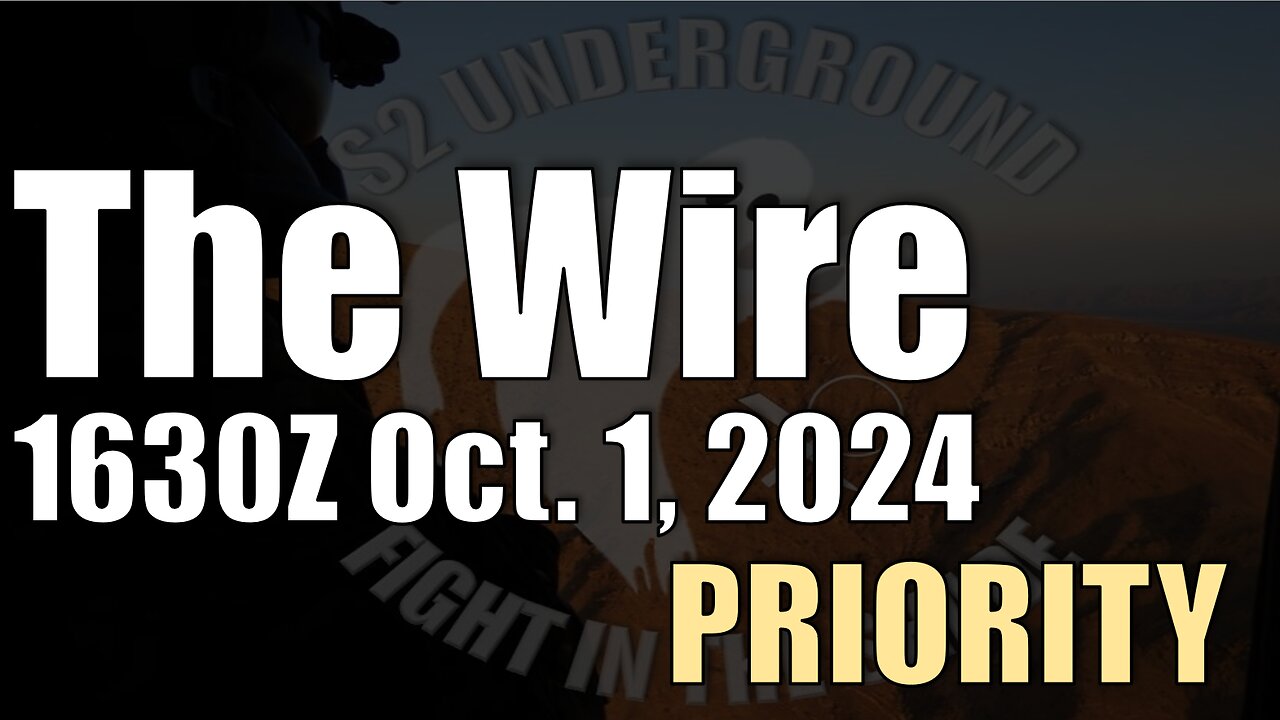The Wire - PRIORITY - October 1, 2024
//The Wire//1630Z October 1, 2024//
//PRIORITY//
//BLUF: ISRAEL BEGINS GROUND INVASION OF LEBANON. RECOVERY EFFORTS CONTINUE IN AMERICAN SOUTHEAST. ILA LABOR STRIKE BEGINS.//
-----BEGIN TEARLINE-----
-International Events-
Middle East: Overnight Israeli forces began their ground invasion of Lebanon. So far, it is unclear as to if this is a limited border incursion or the prelude to a much larger invasion.
AC: Sources on either side have not entirely been reliable, and due to the remote terrain in southern Lebanon, it may be some time before an accurate picture of the advance is obtained. Western media sources have claimed that an Iranian ballistic missile strike is imminent, however it’s not clear as to how any media source could possibly know this information with any certainty. Similar rumors persist regarding the potential for Iran to send troops to Lebanon to assist in their defense against the Israeli invasion.
-HomeFront-
USA: The Longshoremen labor strike officially began at midnight, with roughly 45,000 dockworkers and other personnel shutting down logistics operations along the Eastern seaboard and Gulf Coast. As of right now, the following port facilities are most affected by the labor strike: Boston, Delaware River, New York, Baltimore, Hampton Roads, Wilmington, Charleston, Savannah, Jacksonville, Miami, Port Everglades, Tampa, Mobile, New Orleans, and Houston.
Southeast: Logistical networks have begun to organize more deliberately and aid is beginning to flow into the region as best it can. Roads being impacted or simply no longer existing presents the biggest challenges for rescue and recovery. Price gouging has been reported in many sectors, from fuel to food. Though unconfirmed at this time, truckers are reporting acts of sabotage to their vehicles while parked at truck stops throughout the region. This has allegedly taken the form of slashed tires and tampering with fuel tanks, however it’s not clear as to if these incidents are more representative of routine crime or more deliberate targeting of aid shipments.
Atlantic Ocean: Tropical Depression Kirk increased to a Tropical Storm overnight, and is expected to become a major hurricane over the next few days. AC: It’s too soon to tell if this system is intended for the east coast, however if so this could be a potentially serious complication for the already compromised region.
-----END TEARLINE-----
Analyst Comments: Though substantial aid shipments and infrastructure are allegedly on the way, most locals still have not seen many aid efforts from higher than the local level. There are also mounting allegations that higher-level government aid agencies are discouraging the work of Good Samaritans. On the ground, feelings are mixed; higher level aid is desperately called for, but most people know that federal assets will probably just mess up what’s already being worked at lower levels. As such, there’s a delicate balance at hand which is resulting in conflict: Local volunteers have stepped up where the government has not. However, much more substantial efforts are needed than can be provided by single privately owned helicopters or random citizens carrying one truckload of supplies. However, when state/federal agencies takeover operations and shut out volunteers, they often prove that they can’t do much better of a job than the volunteers paying out of pocket for recovery efforts. In short, if formal agencies could take over rescue/recovery efforts and do the job effectively, most volunteers would probably be happy to hand the reigns over to more qualified professionals. However, in most cases the professionals are either not capable of the magnitude of support needed, or are bound up in red tape that is costing lives every single day, thus the emerging conflict. This is resulting in a unique parallel society whereby locals are working independently of formal aid agencies to fill needs that are not being met. Of course, at the strategic level a rigid and efficient hierarchy and interlocking and coordinating agencies operating at peak efficiency would be highly preferable overall. However, on the ground, the ground truth is that one guy with a pickup truck is punching well above his weight in terms of recovery provided for the overall costs incurred. Those standing knee-deep in mud right now need results, not bickering and red tape. So far, single, uncoordinated individuals have been capable of meeting the needs of many. A similar situation exists regarding local agencies. A single crew in one vehicle from a fire department in the next state over that shows up randomly to a stricken town, is able to perform vastly more efficiently than expected, even without much overhead guidance at all. This brings into question the real-world realities of everything from the Incident Command System (at scale) to the future needs of integration between single volunteers and aid groups. In time, more professional and deliberate agencies will become established and slowly overtake random volunteers in terms of services provided. But in the short term, headaches will result from clashes between groups of volunteers and the bureaucracy that inevitably results from any sort of central planning efforts. Right now, most aid is being centralized in populated areas, and slowly working it’s way along the backroads. One must remember that survivorship bias is absolutely in play regarding recovery efforts; everyone has seen the horrific videos coming out of the disaster area…but this content is only coming to the world from areas that have cellular service. Most of the heavily hit areas still do not have any contact with the outside world, so the true scale of how bad things are is not known. Simply put, we don’t know, what we don’t know.
Regarding higher-level logistical problems, despite many believing that most of the cargo in the United States arrives via the West coast, almost half of all international trade (in terms of dollar value) is imported via the East and Gulf Coasts. Of note, federal military cargo will not be affected by the strike, along with cruise ship operations which are exempt. Some estimates by logistical think-tanks indicate that roughly 91% of all containerized imports are processed by the ports which are now shut down.
Also of note, the chief grievances among the Longshoremen largely revolve around money. The ILA rejected a 50% pay raise (over the next six years), wanting instead a 77% pay increase over the same period. Other grievances include a resistance to use automation, which allegedly threatens union jobs. The White House has already stated that they will not be enacting Taft-Hartley to break this strike, which would be unlikely to matter anyway as ILA President Harold Daggett (in a recent video) already insinuated how the ILA would essentially circumvent any effort to stop their actions. Consequently, though the issues pertaining to labor unions go back to the early 20th century, and these issues are highly controversial, most Americans are likely to be influenced by the exceptionally unfortunate timing of this strike that coincides with the devastation throughout the southeast. Americans are also likely to take umbrage with the demands as they are being made; rejecting a 50% pay increase over a few years and rejecting modernization at a time when, 1- most Americans are lucky to even have a job in the first place (let alone get a pay raise), and 2 - The chief American competitor for trade (China) has already largely moved over to completely automated port operations at most major logistics hubs…this is a hard position to defend even for the most honest and upright entity. Any legitimate contractual complaints/disputes that the ILA had before the events of the past week has largely resulted in sour relations, and the attitude presented by ILA President Daggett in a recent video regarding the labor strike has effectively neutralized any ounce of sympathy the average American might have had beforehand. In the video, Daggett did not do the Longshoremen any favors to the American public, specifically stating that their intent was to “cripple” the world, and deliberately cause the laying-off of workers in other industries if their demands are not met. Now, it quite literally looks like a mafia is holding the nation hostage for more money during a time of crisis, even if the overall situation is vastly more complicated than that. In any case, though Daggett’s support from Longshoremen themselves is likely quite high, as he is taking care of his people, for anyone who’s not a Longshoreman the deliberate and intentional crippling of a national economy by one man is not likely to win any form of endearment from the American people anytime soon. Somewhat paradoxically, now that the strike has gone forward, port facilities are having to lean on automation even more due to the lack of ILA workers…further encouraging the exact thing the ILA was trying to prevent by striking in the first place.
Analyst: S2A1
//END REPORT//
-
 1:09
1:09
S2 Underground
1 day agoThe Wire Special Report - Christmas Eve, December 24, 2024
82210 -
![I AM FINALLY BACK :: PUBG: BATTLEGROUNDS :: RUMBLE NOW HAS GIFTED SUBS!!! [Merry Christmas] {18+}](https://1a-1791.com/video/fwe1/22/s8/1/e/f/C/6/efC6v.0kob-small-I-AM-FINALLY-BACK-PUBG-BATT.jpg) LIVE
LIVE
a12cat34dog
7 hours agoI AM FINALLY BACK :: PUBG: BATTLEGROUNDS :: RUMBLE NOW HAS GIFTED SUBS!!! [Merry Christmas] {18+}
128 watching -
 3:55:42
3:55:42
STARM1X16
7 hours agoMerry Christmas Fortnite
46.8K5 -
 2:45:33
2:45:33
Sgtfinesse
7 hours agoMerry Christmas Night
45.4K16 -
 3:51:18
3:51:18
tacetmort3m
23 hours ago🔴 LIVE - (MERRY CHRISTMAS) TIME TO SPREAD DEMOCRACY - HELLDIVERS 2 OMENS OF TYRANNY
23.4K2 -
 12:42
12:42
Cooking with Gruel
21 hours agoBrown Butter Trifle with Salted Caramel and Cinnamon Apple
18.4K3 -
 2:46
2:46
BIG NEM
10 hours agoDiscovering RAKIJA: The Holy Liquer of the Balkans
15.4K2 -
 1:11:38
1:11:38
Film Threat
15 hours agoCHRISTMAS DAY CHILL STREAM WITH CHRIS GORE | Hollywood on the Rocks
136K30 -
 14:22:40
14:22:40
The Quartering
1 day agoYule Log Christmas MAGA Edition With Memes! Come Hang Out!
226K29 -
 38:41
38:41
MYLUNCHBREAK CHANNEL PAGE
1 day agoTimeline Begins in 1800? - Pt 1 & 2
106K58

5 Comments